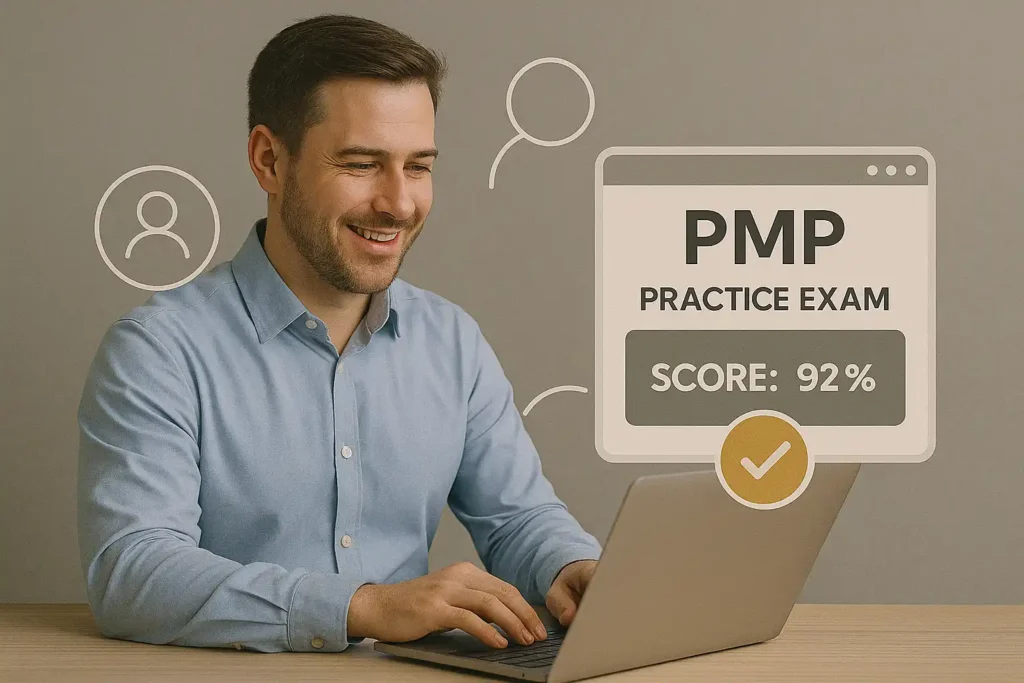How a PMP® Exam Simulator Sharpens Your Confidence and Scores Without the Guesswork
Author: Alvin Villanueva, PMP®, PMI-ACP®; Editor: Geram Lompon; Reviewed by: Grace Payumo, PMP®
You’ve studied the concepts, memorized the terms, and even binge-watched
That’s where a PMP® exam simulator becomes your secret advantage. It’s not a quiz bank as much as it’s your training ground, replicating real exam timing and conditions, and serving as many exam questions as needed to sharpen your instincts. You’re not just prepping for a test but practicing for performance under pressure (Roediger & Butler, 2011).
Instead of walking into the exam room wondering what kind of curveballs PMI® might throw, you walk in with practiced calm, because you’ve already been there, virtually, thanks to a reliable online tool.
A good simulator shows you what you know, what you’re guessing on, and where your thinking patterns might trip you up. It’s not about chasing perfect scores but showing up prepared in ways that flashcards and textbooks alone can’t deliver (Roediger, Putnam, & Smith, 2011).
What Is a PMP® Exam Simulator and Why Does It Matter for Your Prep
A PMP exam simulator is more than a mock test. It’s a full mental rehearsal of the actual exam. You’re not just answering questions, you’re learning how to think like a PMI professional, respond under pressure, and stay focused for nearly four hours straight through project management training lessons, with guidance.
Simulators recreate the exam’s length, layout, and logic, helping you build endurance and confidence before the real exam even begins. (Project Management Institute [PMI], 2021).
Think of it as a bridge between necessary training, studying, and testing, where knowledge becomes usable skill. It reveals the subtle traps that PMI sets and teaches you to slow down, analyze, and make decisions with intention in your PMP practice, utilizing the right training materials. For many, this is where scattered study finally clicks into sharp, strategic thinking.
Without it, you’re just hoping your prep translates to performance. With it, you’re testing that theory before the stakes are real, and adjusting your exam study plan. At the same time, there’s still time to improve for maximum exam success.
Using PMP® Simulators Strategically: What Works and What Doesn’t
A PMP exam simulator is powerful, but only if you use it the right way. Some candidates treat it like a game, aiming for a high score rather than focusing on a deep understanding. Others skip reviews entirely, missing the chance to catch patterns in their thinking.
If you’re not intentional, ask question after question that prepares you for the PMP certification exam, based on questions developed without actually improving, particularly with guidance from a certified PMP team.
Misusing the Practice Test Scores as the Only Metric
It feels good to see a passing score on a mock exam, but that number can be misleading. A 75% might seem like progress for the real exam, but if you’re guessing on half of those, you’re not gaining confidence, you’re building false certainty. What matters more is why you got a question right, and whether you’d get it right again in a different context (Roediger & Butler, 2011).
Focus on the quality of your decisions, not just the number of correct answers, to improve your test-taking competence. Every score should open a door to reflection, not just celebration.
Failing to Review Rationales or Spot Patterns
Skipping the review phase is one of the biggest mistakes candidates make. The value of a simulator doesn’t end when the timer does. That’s actually where it begins, especially when you seek detailed explanations. The post-exam breakdown reveals which domains are shaky, where your logic is off, and what consistently pulls your focus (PMI, 2021).
Use those patterns to guide what you study next. If you’re consistently second-guessing Agile scenarios or misreading risk responses, that’s not failure; it’s a sign of direction.
What to Look For in a High-Impact PMP® Exam Simulator
Not all simulators are created equal. A good PMP exam simulator does more than ask questions; it challenges assumptions, exposes blind spots, and mirrors the real PMI exam experience.
If it feels too easy or provides sample questions that are too random, it’s probably not preparing you well like the best exam prep tool would.
Realistic, ECO-Aligned Questions That Reflect PMI’s Style
The most effective simulators follow PMI’s latest PMP Exam Content Outline (ECO), which means their questions aren’t random trivia but strategic scenarios across the People, Process, and Business Environment domains that build your exam-taking confidence. (PMI, 2021). You’re not just asked about the knowledge area you know, you’re asked how you’d lead in complex situations.
A good simulator effectively reflects this complexity through training lessons, multiple-choice logic, multi-response challenges, and ethically driven scenarios.
Innovative Features Like Tags, Filters, and Adaptive Modes
A simulator isn’t just a test; it’s a training platform. Look for one that lets you filter by topic, difficulty, or confidence level. That way, you’re not wasting time; you’re focusing where it counts.
Platforms like the ROSEMET PMP Course Bundle include adaptive question engines and performance dashboards, helping you track patterns and train with purpose (ROSEMET LLC, 2025).
Bonus Tools That Reinforce Learning (Not Just Testing)
Some simulators stop at multiple-choice. The great ones go further. They don’t just test you, they teach you. These features aren’t extras; they’re accelerators. When a PrepCast PM Exam Simulator adapts to your learning rhythm, you’re not just answering, you’re absorbing.
Mobile-Ready Platforms That Fit Real Life
You won’t always study at your desk. A mobile-friendly simulator or one that works offline helps you stay consistent. Still, it requires an active internet connection for updates. It removes excuses and makes prep a seamless part of your daily routine.
Study momentum isn’t about volume; it’s about rhythm. The right platform helps you build that, wherever you are.
In-Depth Explanations That Clarify Concepts
Getting a question right is one thing, but developing your time management skills is crucial. Understanding it is another. Strong simulators explain not only why one answer is correct, but also why the others are not. That insight retrains your thinking, not just your memory (Roediger et al., 2011).
ROSEMET’s PMP Course Bundle takes it a step further, pairing each question with cheat sheets, summaries, and structured lessons (ROSEMET LLC, 2025).
How to Make PMP® Simulators Work Smarter (Not Harder)
It’s easy to click through mock exams and hope the score improves. But growth comes from rhythm, review, and reflection. A complete exam strategy with a PMP simulator sharpens your thinking if you use it with a plan.
Simulate Full Exams Weekly
Schedule full-length simulations every week in your final month of prep. This isn’t cramming, it’s conditioning. You’re training endurance, attention, and composure.
Over time, you’ll gain more than a score; you’ll acquire data. You’ll see where you fatigue, where you rush, and where your clarity breaks down.
Use Mistakes to Shape Study Plans
Don’t just log results, study them. Review flagged questions, changed answers, and the ones you got right by accident. That’s where your study roadmap begins.
ROSEMET’s built-in analytics track weaknesses by domain. Let that insight guide your next steps (ROSEMET LLC, 2025).
Are Free PMP® Simulators Worth It?
Free tools are useful—up to a point. They help you get familiar with the test layout and question flow. But most hit a ceiling fast. What you need for exam readiness is depth, feedback, and ECO alignment.
Good for Early Exposure
Free simulators work when you’re just starting. They offer a peek into how PMI frames questions and what pacing feels like before your first exam. But they rarely reflect the nuance of scenario-based thinking.
Limited for Final-Stage Prep
Most free tools don’t follow the latest ECO. They focus on fact recall instead of decision-making. They rarely offer quality explanations or performance tracking.
That’s why platforms like ROSEMET make the difference, combining realism with reflection tools designed for long-term retention (Roediger & Butler, 2011; ROSEMET LLC, 2025).
The Smartest Way to Use a PM Exam Simulator
A PMP exam simulator shouldn’t be a quiz engine; instead, it should provide practice mock questions that enhance learning. It should be a learning system. When you approach it as training, rather than testing, you develop resilience, pattern recognition, and professional-level judgment.
Patterns Lead to Precision
The best simulators help you track trends across time, topics, and thinking errors. When you know what consistently trips you up, especially with guidance from PM-certified trainers, you stop studying everything and start focusing where it counts.
It’s not about scoring high. It’s about thinking more sharply.
ROSEMET’s All-in-One Learning Ecosystem
You don’t need scattered tools. You need a system that connects your practice to your progress for the current PMP exam. ROSEMET’s PMP Course Bundle syncs your simulation with content, feedback, and goal-driven review (ROSEMET LLC, 2025).
It’s not just a tool. It’s your prep strategy.
Final Thought: Confidence Isn’t Guesswork. It’s Repetition With Insight.
You’ve already invested the hours—now it’s time to refine how those hours are presented. A PMP simulator doesn’t just test what you know. It reveals how you think, what you miss, and where your instincts need fine-tuning, based on the training you received, especially during your contact hours.
When it’s part of an integrated system like ROSEMET’s, that insight becomes preparation, and that preparation becomes peace of mind (ROSEMET LLC, 2025).
Key Takeaways
- PMP exam simulators turn passive study into an active strategy. They condition your mindset and sharpen your judgment.
- Review, not just results, fuels real growth. Post-exam analysis is where your learning accelerates.
- Tool quality matters. Look for ECO alignment, scenario logic, and meaningful feedback.
- Free tools are helpful, but they have limitations. Use them early—but don’t rely on them late.
- Integrated systems like ROSEMET elevate your prep. One platform. One strategy. No guesswork.
- Repetition breeds readiness. You don’t need to guess your way through the PMP—you need to train for it.
References
American Psychological Association. (2020). Publication manual of the American Psychological Association (7th ed.). American Psychological Association.
Project Management Institute. (2021). A guide to the project management body of knowledge (PMBOK® guide) (7th ed.).
Project Management Institute. (2021). Exam content outline: Project Management Professional (PMP)® . https://www.pmi.org/-/media/pmi/documents/public/pdf/certifications/pmp-exam-content-outline.pdf
Roediger, H. L., & Butler, A. C. (2011). The critical role of retrieval practice in long-term retention. Trends in Cognitive Sciences, 15(1), 20–27. https://doi.org/10.1016/j.tics.2010.09.003
Roediger, H. L., Putnam, A. L., & Smith, M. A. (2011). Ten benefits of testing and their applications to educational practice. Psychology of Learning and Motivation, 55, 1–36. https://doi.org/10.1016/B978-0-12-387691-1.00001-6
ROSEMET LLC. (2025). PMP course bundle: Scenario-based training and exam simulation tools. https://www.rosemet.com/pmp-course-bundle/
Keywords: PM Prepcast exam simulator, CAPM Exam, Four complete exams, Separate quiz pool, Exam date, Day Access, Regularly offer discount coupons, agile practice guide, earn contact hours, simulator today, minimum speed, pm prepcast course, experienced education provider, thorough explanations, simulator asks, simulator features, coupon expiration date, previous students, high speed connection, extension policy guidelines, pm knowledge, prepcast simulator, accepting discount coupons, instant feedback, desktop computer, refund request, pioneering education approach, holistically prepare

